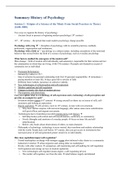Samenvatting
Summary for History of Psychology
- Instelling
- Universiteit Twente (UT)
For the course History of Psychology I created this complete, yet small, summary. By learning this, together with the overview I created, I got an 8 on the test.
[Meer zien]




